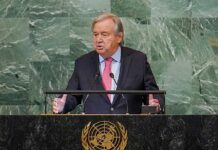Print Both sides have spoken harshly hours ahead of the upcoming talks in Geneva between the United States and Russia. It takes dialog to get these differences sorted and to avoid confrontation with other sides, Blinken said. It is possible that Russia will have massive consequences if it resumes aggression in Ukraine.
(Reuters) Reports: – The United States and allies are prepared to discuss with Russia in talks about Ukraine the possibility of each side restricting military exercises and missile deployments in the region, a senior U.S. administration official said on Saturday.
With crucial talks set to start on Monday in Geneva, the senior Biden administration official said the United States is not willing to discuss limits on U.S. troop deployments or the U.S. force posture in NATO countries in the region.
President Joe Biden has warned Russia will face severe economic consequences if Russian President Vladimir Putin were to launch an invasion of Ukraine. U.S. officials on Saturday provided more details on tough sanctions that could be imposed.
One restriction, as described by a source familiar with the plan, could target critical Russian industrial sectors, including defense and civil aviation, and would invariably hit Russia’s high-tech ambitions, such as in artificial intelligence or quantum computing, or even consumer electronics.
The Geneva talks, to be followed by other sessions next week in Brussels and Vienna, are aimed at averting a crisis. Putin has massed tens of thousands of troops along the border with Ukraine, generating fears of an invasion.
It remained unclear whether the United States and its European allies can make progress in the talks with Moscow. Putin wants an end to NATO’s eastward expansion and security guarantees, demands the United States says are unacceptable.
But the senior U.S. official, briefing reporters ahead of the talks, said some areas present opportunities for common ground.
“Any discussion of those overlapping areas where we might be able to make progress would have to be reciprocal,” the official said. “Both sides would need to make essentially the same commitment.”
Russia says it feels threatened by the prospect of the United States deploying offensive missile systems in Ukraine, even though Biden has assured Putin he has no intention of doing so.
“So this is one area where we may be able to reach an understanding if Russia is willing to make a reciprocal commitment,” the official said.
The United States is also willing to discuss restrictions by both sides on military exercises, the official said.
“We are willing to explore the possibility of reciprocal restrictions on the size and scope of such exercises, including both strategic bombers close to each other’s territory and ground-based exercises as well,” the official said.
The official said Washington is open to a broader discussion on missile deployment in the region. In 2019, Former President Donald Trump withdrew from the 1987 U.S.-Russia Intermediate-range Nuclear Forces Treaty, on accusations Moscow was violating the accord.
A separate senior Biden administration official said penalties being explored in the case of a Russian invasion would not start low and be tightened over time.
“Instead, we would adopt a ‘start high, stay high’ approach in which we – in coordination with our allies and partners – would immediately impose severe and overwhelming costs on Russia’s economy, including its financial system and sectors deemed critical to the Kremlin,” the official said.
The United States has been discussing with allies and partners in Europe and Asia a range of trade restrictions under consideration, the source familiar with the planning said.
No decisions have yet been taken, but restrictions under consideration could impact U.S. products exported to Russia and certain foreign-made products subject to U.S. jurisdiction.
Russia could be added to the most restrictive group of countries for export control purposes, together with Cuba, Iran, North Korea and Syria. These actions could also restrict export of products made abroad if they contain more than a specified percentage of U.S. content.
























































